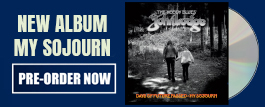 Moody Blues — here and now
Moody Blues — here and now
March 17, 2015
Telegram.com
By Richard Duckett TELEGRAM & GAZETTE STAFF
It wasn’t 10,000 light years ago that John Lodge joined the Moody Blues.
Still, a lot has happened since 1966 when Lodge and Justin Hayward became Moodies just as the band was about to change mood, music and direction.
The future has become the past, but the Moody Blues are still present. The British progressive rock band will be at The Hanover Theatre for the Performing Arts in Worcester for a show at 7:30 p.m. March 19 that kicks off its 2015 “Timeless Flight — The Polydor Years” U.S. tour in support of the recent release of six retrospective CDs and two DVDs.
“When the Moody Blues are on stage, we bring together everything we’ve learned over the last 50 years,” said Lodge, bassist and vocalist and one of three core Moodies (with vocalist and guitarist Hayward and drummer Graeme Edge) performing March 19 with other musicians rounding out the sounds. “We’re not looking back when we perform. When we perform this we’re playing this today with everything we’ve learned about it,” Lodge said.
Later during the tour, on May 5, “10,000 Light Years Ago,” Lodge’s first solo album since “Natural Avenue” in 1977, will be released.
This atmospheric album has guest contributions from former Moody Blues members flutist Ray Thomas and keyboardist/mellotron player Mike Pinder. Veteran guitarist Chris Spedding is also speedily and pleasingly recognizable.
“Days of Future Past,” the Moodies’ big album smash from 1967 with hits such as “Nights in White Satin,” explored time, and Lodge, a prodigious songwriter (“Isn’t Life Strange”) continues in that vein with “10,000 Light Years Ago.”
“I think that this theme has continued in the music of the Moody Blues and in my music, and it’s a musical record of our generation traveling through life. With ‘10,000 Light Years Ago,’ I have continued this theme of constant evolution, as everything in the future remains in reach, and although the past is behind us, it once was our future.”
Lodge, 69, is originally from Birmingham, an industrial city in the Midlands and England’s second-largest (to London). But he was quite a long way from Birmingham rain when interviewed by telephone last week. He spends a lot of his winters in Barbados, where he can “get away from the inclement weather in the UK,” as he put it. Hopefully, some of Worcester’s snowbanks will have disappeared by March 19.
But let’s go back to the past again. The Moody Blues had been formed in Birmingham in 1964 as an R&B group (Edge is the only original member) and had a hit that same year with a cover of the Bessie Banks classic song “Go Now.”
The personnel changes in 1966 (Lodge and Moodies co-founder and flutist Ray Thomas were old friends) were indicative of a band pondering its future.
“Yeah, because I’d been playing in clubs everywhere since I was 14, 15,” Lodge said. “And they were all cover songs — what was the latest fad coming out of the United States, really. And we felt we needed to find our identity. We all felt that — that we needed to find our way as musicians.”
The Moodies hung out in Belgium for a few months, writing new material and bonding. “Whenever anyone writes it becomes our song.”
Trying it out publicly, “In a very short time we realized the audience preferred our own songs. We dropped all the covers,” Lodge said.
“Days of Future Past” was a concept album taking the listener through a day (“The Day Begins,” “Tuesday Afternoon,” “Nights in White Satin”) as rock (sometimes psychedelic) and lyrics that could be called moody were accompanied by full orchestration and the London Festival Orchestra.
It was a rich and persuasive mix, but Lodge recalled that promoters used to the old sound needed to be persuaded that this was the Moodies’ future. Not all were.
“We had to find different promoters because everyone wanted to dance, and some said, ‘They rock and roll and then there’s a waltz.’ ”
The Moodies started appearing on campuses. “Colleges and universities were perfect. People would sit on the floor and it didn’t matter. Then there was FM radio.”
Other “high pop concept” albums would follow, including “On the Threshold of a Dream” and “A Question of Balance,” with total sales in excess of 70 million.
Another big hit was “Isn’t Life Strange.” Asked if there was anything that sparked that song, Lodge said, “It’s an acceptance that sometimes the truth is right in front of your eyes.”
As for “10,000 Light Years Ago,” “I’ve been wanting to record a new album for probably the last 10 years. Either the Moody Blues or myself,” Lodge said. (The Moodies haven’t released a studio album since “December” in 2003.)
“I wanted to make an album as we would have done in the old days where all the musicians contributed.…For me it sounds like a group album.”
Getting people together as a group can be a challenge, which isn’t such a bad thing in Lodge’s eyes because when like-minded musicians do contribute, you know what the mood is going to be.
“It’s very important that we have our own independence. The reason you’re together is to make music. We all have our own lives and come together as the Moody Blues,” Lodge said.
For his part, “There was a saying in the ’60s, ‘Have guitar, will travel.’ That’s who I am, to be honest. I do enjoy playing every day. Even in Barbados, I’ll go and play in a jazz band because I’m asked and I enjoy playing.” In the present.






